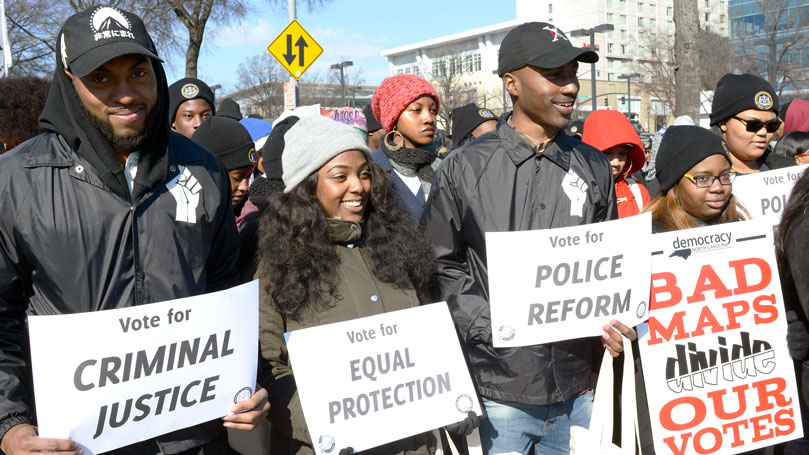
This text is excerpted from a recorded address of former CPUSA National Chairman Henry Winston. The original audio can be heard here.
This subject matter is of extreme urgency for the Party as it is for the mass movement as well. In the conditions of the U.S. no greater error can be made than to try to sever the class aspects of matters from the race and national. To do so would be a disservice to either and to weaken the total fight against our class enemy: monopoly in general and the most reactionary sector, the military-industrial-complex, in particular. This enemy cannot be defeated by Afro Americans alone, labor alone, or the peace movement alone. Means have to be found to unite these forces to trounce this enemy.
Before the Party is the task of understanding itself and the primacy of the task of building the Party as a precondition for moving to effect those kinds of alliances that can move the all-people’s front developments within the country.
To understand the Party correctly is to understand that the fight for its building is first of all the fight to develop the broadest kind of unity in struggle, beginning with the labor movement — first of all, the organized labor movement, but the unorganized as well. In the concrete conditions of the U.S. today, we are in a period around which any progress of a permanent character is dependent on that labor–Afro American alliance. Not to see this is not to see anything of a progressive character in the struggle against monopoly in the U.S. today.
We have the fortunate experience of being members and leaders of the only force in this country which can affect the kind of change that can advance the cause of our class and our people. The Party is the only instrument that we can use to resolve questions that can advance the anti-monopoly struggle. We take into account all of the intermediary steps, to widen the fight for democracy and, in the course of struggle, build the Communist Party.
We must explain the contradiction between Party growth and the massive movement of struggle amongst Black Americans.
We have been discussing Party building since the Milwaukee Extraordinary Conference. But we note that there is a contradiction between Party growth and the massive movement of struggle amongst Afro Americans. We are called upon to explain this contradiction. This is all the more necessary now because of a whole series of events, including the overall decline of the labor movement, which arises out of the structural crisis, the regular cyclical crisis, and the introduction of new technology. This decline hits sharpest at Black workers. What to do under circumstances like this? What program are we advancing for our Party to help us to meet this moment? Much is needed on this front in which, area by area, Black people are facing a situation in which conditions are being created to treat them as social pariahs, without any perspective of entering industry or having a livelihood.
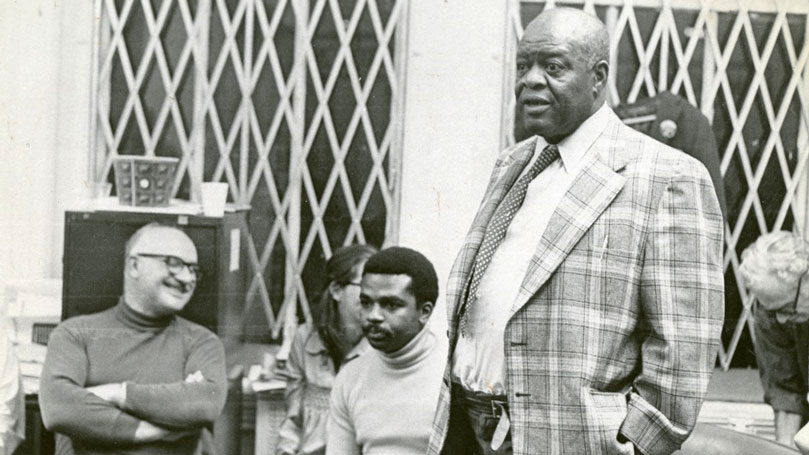
This is unprecedented in the U.S.A. The Reagan Administration has put forward the proposition to take the government out of this whole business: let private industry do it. Reagan is saying that the advances made by labor and the people through sweat and blood — including jailing and murders on picket lines — should be erased and we should return to the days preceding the Wagner Act. This affects not only the economic, political, and social status of Black people; but it represents the crudest form of racist rule in the U.S.
Triple Concentration and its importance
What do we mean by “triple concentration”? We are saying that this is the very essence of the struggle for equality. This struggle is a precondition for raising the level of the whole class to advance.
The question of racism needs clarification; it needs a certain understanding by Communists. The class essence of racism is two things at once. For monopoly, racism represents a unity for exploitation and national oppression for the purpose of higher and higher profits. What would it mean if the working class would shatter the oneness of the two? It would play into the hands of the oppressor. Racism is on the one hand a special fight to depress the position of Black workers and Black people in general, but on the other hand to use white workers for the benefit of the exploiter. You are not fighting racism when you only see one aspect. You are fighting racism only when you see the double aspect of the whole problem. The fight against racism is at one time a struggle for the unity of the working class on a class basis — a unity which is possible only to the extent that you take into account the special problem of denial of Black workers and Black people.
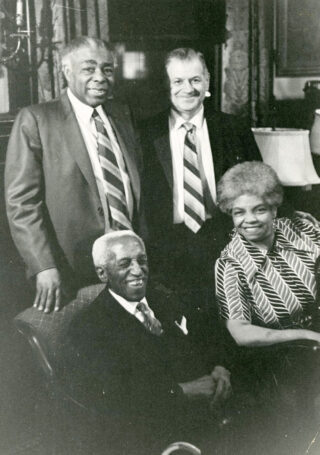 There is a certain dialectical approach. The white worker must understand that to the degree that he accepts and is influenced by racism, whether in the realm of ideology or practice, serves not his class interest, nor is he doing a favor to Black workers by changing this, that, or the other. The labor movement has class aims, class objectives, which are attainable only by class unity, equality. Equality is not helping some poor Black over here. It is a fight for the unity of the whole class. On the other hand, the answer to inequality likewise is a contribution not only to the advance of the cause of Black liberation, but to the struggle for the unity of the whole.
There is a certain dialectical approach. The white worker must understand that to the degree that he accepts and is influenced by racism, whether in the realm of ideology or practice, serves not his class interest, nor is he doing a favor to Black workers by changing this, that, or the other. The labor movement has class aims, class objectives, which are attainable only by class unity, equality. Equality is not helping some poor Black over here. It is a fight for the unity of the whole class. On the other hand, the answer to inequality likewise is a contribution not only to the advance of the cause of Black liberation, but to the struggle for the unity of the whole.
We need, still, much more clarity. If there ever was a single thought that was important in class struggle today, it is this process. The answer to the question of class versus race or race versus class or class versus national, is clear. It is answered by this Marxist-Leninist class approach to all questions. Without this understanding, there might be a lot of rhetoric, there might be a lot of loud talk about equality, but it is not yet a struggle for equality. It has meaning only when it is anchored in the spirit of proletarian internationalism. Have all questions been battled out on seniority and affirmative action? Can this be said? We have much more to do. We have to move with haste, with speed. We’ve got to put an end to trying to put yesterday’s solutions to today’s problems.
It doesn’t take much argument to prove that private industry cannot handle this question. Everyone would agree with that. Even to put this question means already to see growing slums, to see the question of evictions, of drugs, etc. The problem is a class one, and we must see that the only way under these conditions is not private industry, but governmental responsibility to solve these social problems, these economic problems.
The question we are capable of solving is the question of a governmental program of an anti-monopoly type, a strong anti-monopoly program in which billions, even trillions, can be spent for social needs and not for nuclear war. For the class and especially for Black people, the solution is to be found in ways other than the policies of Reaganism. The solution must be associated with the fight against Reagan’s policies. We should set up a commission to come up with this program. This is urgent and immediate.
We must develop a common policy, ideologically based, in which we are working among people who are more than friendly to us.
The building of the Party means, first of all, an ideological–political approach to solving all questions of concern. You cannot develop a jobs program without defining the enemy, what methods need to be developed, which forces are necessary. This is our role. We are called upon to develop a common policy which is ideologically based in which we are working among people who are more than friendly to us — who want our message, who are asking where we’ve been.
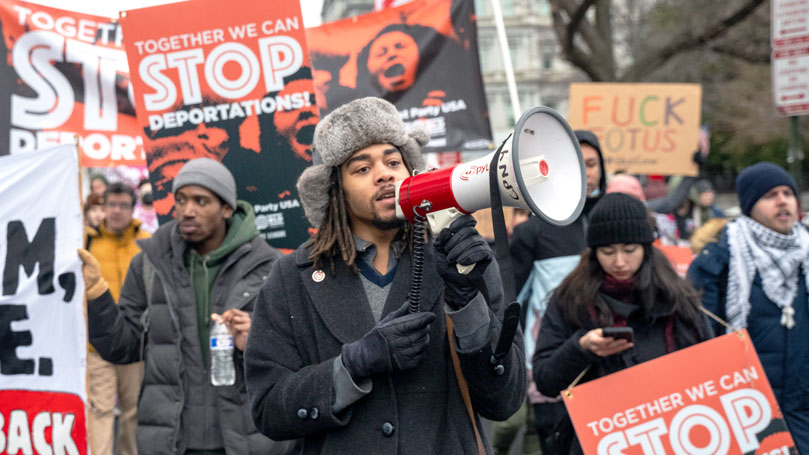
I am arguing against a concept, which, after a discussion, proceeds to organize the fight in old, routine, bureaucratic ways. In this regard, one does not have to argue too much against right reformism, but that, too, has to be argued against.
What one has to be aware of nowadays to defend the purity of Marxism-Leninism and our Party is the fact that the enemy has assigned to the Black community all of its agents to discredit the Party. The April 28th issue of Frontline (Line of March) has an editorial which analyzes the Rainbow Coalition in a way in which it becomes crystal clear that a false conclusion is being drawn. It raises that Jesse Jackson is representing a tendency in which the Rainbow Coalition must become the leader of the anti-monopoly fight and that labor has no role except that it follows the Rainbow.
This is done to offset an analysis which must come from the Party, which gives clear leadership — an analysis that sees that Rainbow’s orientation is to the enlightened Democrats within the framework of the Democratic Party. How to recognize what is good and what is limited is not examined. The question of independent political action is played down. When the Democratic Party becomes the mechanism through which everything is channeled in the mass movement, where will Frontline be? Where will our Party be?
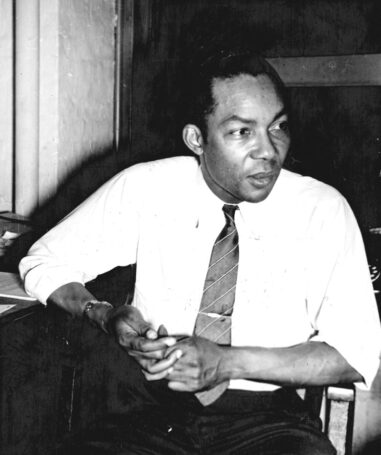 There is a first class ideological and political problem here. We must be able to answer clearly. The question is how to develop political independence that is developing from within, independence that unites with outside tendencies of political independence, an independence which brings together forces from without, finding allies everywhere. Political independence is many sided. Operating on this basis, and reinforced on this basis, the struggle itself for the issues of the people, we are unbeatable. Some people won’t want to do this. Some for opportunist reasons. But our Party has a special task here.
There is a first class ideological and political problem here. We must be able to answer clearly. The question is how to develop political independence that is developing from within, independence that unites with outside tendencies of political independence, an independence which brings together forces from without, finding allies everywhere. Political independence is many sided. Operating on this basis, and reinforced on this basis, the struggle itself for the issues of the people, we are unbeatable. Some people won’t want to do this. Some for opportunist reasons. But our Party has a special task here.
We are underestimating the 1986 elections and the significance of the Congressional elections. How can we see the presidential election in 1988 without November 1986? Are we in the struggle ideologically? Do we have literature out there?
In 1903, the Bolshevik tendency triumphed. Five years later Lenin wrote against reformism, right and left. In vol. 15, page 37 and 38 Lenin develops polemics against Bernstein. He was the worst possible deviator of them all. Bernstein said the most important thing is the movement. “The movement means everything, the final aim, nothing.” The final aim of socialism and communism means nothing. This was the man from the left. He had a lot of talk of action, action, action. What kind of action? Not action which excludes our ideology, our practice. Our action must see our ideology as an integral part of the action itself, its development and growing in the course of it all. Only the Party will lead in that direction.
Harlem
When it comes to organizing the movement for housing for Black people in Harlem, I can see the tenants’ movement three or four ways. I can see housing movements of non struggle and non-involvement in other kinds of issues that concern Black people in Harlem. I can say the same thing about Civil Rights, or education.
But I can see a standstill in Party growth in Harlem. Why? We distribute thousands of papers. But are these papers used to develop higher and more concrete forms of struggle, or do we distribute them as things in themselves?
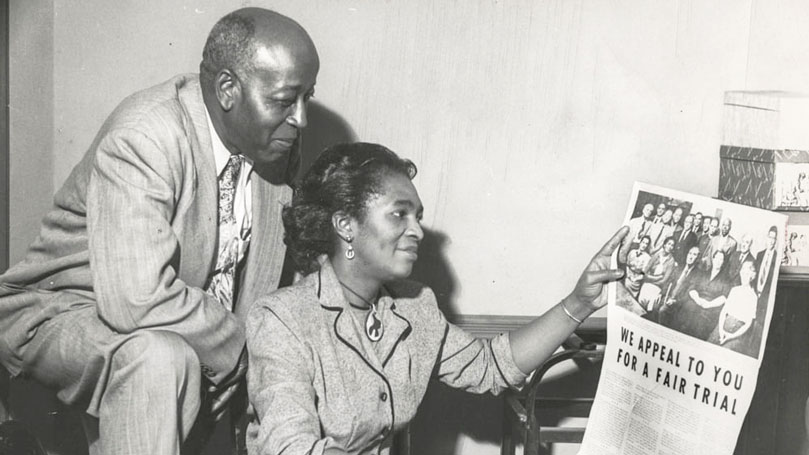
Lenin’s polemic has as its end point the decisive character of building the Party, and Lenin always speaks of struggle, struggle, struggle. Party growth is simply not a question of Angela Davis coming to a meeting: building the Party solely on this basis we are lost. What we need to think about is fighting for the needs of the people lest some ultra strong demagogue come along to stage a demonstration, attempt to speak to the gallery on issues, rather than being a part of mass organizing, to prevent mass action.
But in doing things [in a routine] way, we are unfortunately prey for the situation which is directly against the Party. There is not a community in Harlem or anywhere else in which on the basis of consistency, patience, organization, and a realistic program, progress cannot be made.
When you speak of Black people, you are speaking of an important sector of the working class.
By triple concentration we are saying that the national, state, and Harlem [Party] will agree on a common program that will take into account that District 65 [United Auto Workers] has a large part of its membership, if not the majority, living in Harlem, but who work downtown, and they go to their unions downtown — a program that would recognize that 1199 has some 7500 members, hospital workers, of which half or the majority are Black and Puerto Rican, that they earn their livelihood downtown; but they live in Harlem. When we think in terms of the Harlem population, we are thinking about men and women who work for a living, who have to live somewhere — and do live somewhere. If we think in terms of not only Local 420 but other AFSCME locals — they also earn a living outside of the Harlem community, but they live in Harlem. The same is true of TWA as well. No one could say the leadership of TWA reflects the membership composition of that union. This can be said for the garment [workers’], and the waterfront [workers’ unions], and other unions as well. When you speak of Black people, you are speaking of an important sector of the working class.
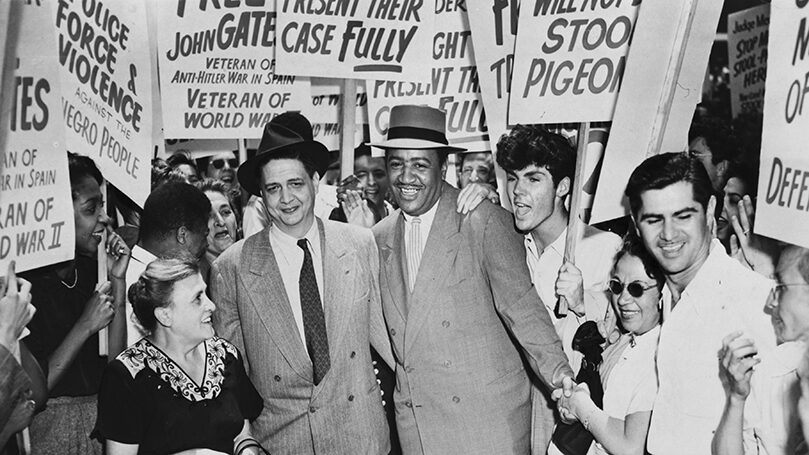
These same people are members of church choirs, deacon boards, usher boards. They are Baptists, Methodists, Anglicans, Catholics. Their ideology is being formed.
A policy of triple concentration has meaning only if Harlem is understood in this way, that there are to be found in unions [people] within and without the Harlem community.
Now, there is a problem. One of our proud achievements was that of the role of our Party in helping to elect Ben Davis to the City Council. This was not a small task. No individual — no matter their social background, no matter how brilliant and even popular — could ever have been elected without the greatest degree of practical work, without organization based upon the idea of smashing segregation and Jim Crowism. So what happened? First was the fight to win proportional representation. Communists distinguished themselves in this particular fight. Second, Clayton Powell had higher goals and went on to achieve them. But he selected Ben Davis as the running mate, because of the role of our Party, the issues and so on.
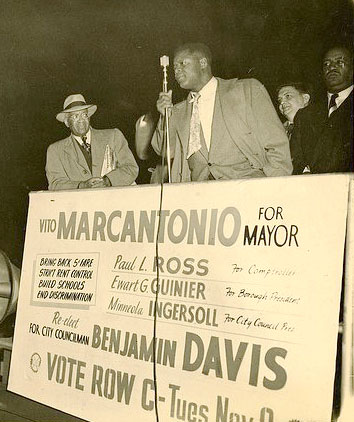 But Ben Davis couldn’t have been elected after that. He did not have the Abyssinian Baptist Church, with its 25,000 members, as a base. First, Joe Brodsky was already in the race, running for City Council. And for the first time in the history of New York, you had a white Communist declining to run in favor of a Black man, Ben Davis, which immediately threw the whole weight of the Party behind Davis. I don’t think that has happened any place else in the country. It was then and only then that people like Robeson, Lena Horne came out to support him and laid the basis for his election.
But Ben Davis couldn’t have been elected after that. He did not have the Abyssinian Baptist Church, with its 25,000 members, as a base. First, Joe Brodsky was already in the race, running for City Council. And for the first time in the history of New York, you had a white Communist declining to run in favor of a Black man, Ben Davis, which immediately threw the whole weight of the Party behind Davis. I don’t think that has happened any place else in the country. It was then and only then that people like Robeson, Lena Horne came out to support him and laid the basis for his election.
These were the days of the democratic front, the people’s front, a high point in the anti-war struggle. But the election of Ben Davis was the Party, the Party and the unions, the Party and all kinds of people’s organizations — Mason lodges of all kinds, churches, etc. This was one of the brightest possible periods.
The Party affected in that period Harlem concentration, which was so conceived. It was not conceived of as a handful of Communists in Harlem. That would be totally wrong, not understanding what was required then and now.
Trade unionism must become the means by which white and Black within the union and within the community are fighting for Black equality.
Therefore, the fight within the unions for correct policies will reflect itself concretely where Black people live. And you will not have a situation like you have among the teachers, where Black teachers are hostile to the teachers’ union — AFT and Shanker. Trade unionism must become the means by which white and Black within the union and within the community are fighting for Black equality. Can anyone say this happens now? Can anyone doubt the validity of what could happen if this were struggled for?
What unions? Musicians, hotel, TWA, longshore, 1199, [UAW District] 65, teachers — all of them. It is idle to talk about class unity without raising class consciousness and class understanding.
Put our shoulders to the wheel
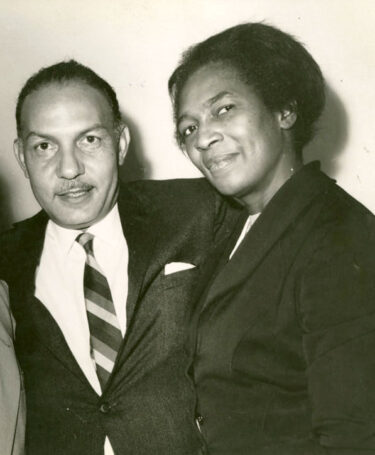 We have this ideological problem to solve. It can only be solved by a common approach to the problems of Harlem. The perspective of [recruiting] 150 Black Communists is not only possible, it frankly can be overfulfilled in a very short period of time if we put our shoulders to the wheel in one direction. Certainly, an initiation of struggles can put an end to bickering and backbiting, which always emerges from non–mass activity, non-struggle — doesn’t help the struggle at all — and to conceive of unity without this is not to see unity.
We have this ideological problem to solve. It can only be solved by a common approach to the problems of Harlem. The perspective of [recruiting] 150 Black Communists is not only possible, it frankly can be overfulfilled in a very short period of time if we put our shoulders to the wheel in one direction. Certainly, an initiation of struggles can put an end to bickering and backbiting, which always emerges from non–mass activity, non-struggle — doesn’t help the struggle at all — and to conceive of unity without this is not to see unity.
Therefore, I think we must say that it is absolutely wrong only to see negative, absolutely wrong to have any kind of hopeless, pessimistic outlook towards events. And it would be wrong to just sit and wait. Our answer has to be that of struggle for policy, struggle for organization, proper organization of our forces, recognizing that small numbers is but temporary. Proper approach, proper organization of our work can double, triple, quadruple, even do more for the membership of our Party. We have to put an end to a situation where in our affairs we see few Black people. This does not correspond to what Black people are thinking. What is required is to not only program but to sit down and organize, outline for classes about the main things and the main way out.
Why then all of this talk? It is to put before our leadership the necessity of agreeing to the concept of a triple concentration policy, which would be wrong to be regarded as an organizational process alone in which there is periodic consultation between the three bodies [Harlem, state, and national Party leadership], but the unity of the three bodies in elaborating a program that can win. Within this framework I think we will not be found lacking in our ability to achieve great success.
Images: 2016 Moral March On Raleigh 46 by Stephen Melkisethian (CC BY-NC-ND 2.0); Henry Winston addreses a gathering. Present in the background: Jim Steele and Arnold Bechetti (CPUSA); Claude Lightfoot with Chicago civil rights leaders (CPUSA); CPUSA members marching at the Jan. 18 2025 People’s March in D.C.; Jamaican born CPUSA leader and National Maritime Union co-founder Ferdinand Smith (CPUSA); Claudia Jones and Petis Perry (CPUSA); Smith Act defendants NY State Communist Party Chair Robert Thompson and Benjamin J. Davis, Jr. outside the Federal Courthouse in Foley Square; Henry Winston speaking at 1949 election rally (CPUSA); James E. Jackson and Claudia Jones (CPUSA)
Comments
- Tags:
- African American Equality Commission
- African American History Month
- African Americans
- All-people's front
- Black Communists
- Black History
- Black History Month
- Black liberation
- Communist Party
- equality
- Extreme right
- Henry Winston
- Labor
- monopoly
- monopoly capital
- Party Building
- peace
- People's front
- Racism
- united front
- unity
- working class


 Join Now
Join Now